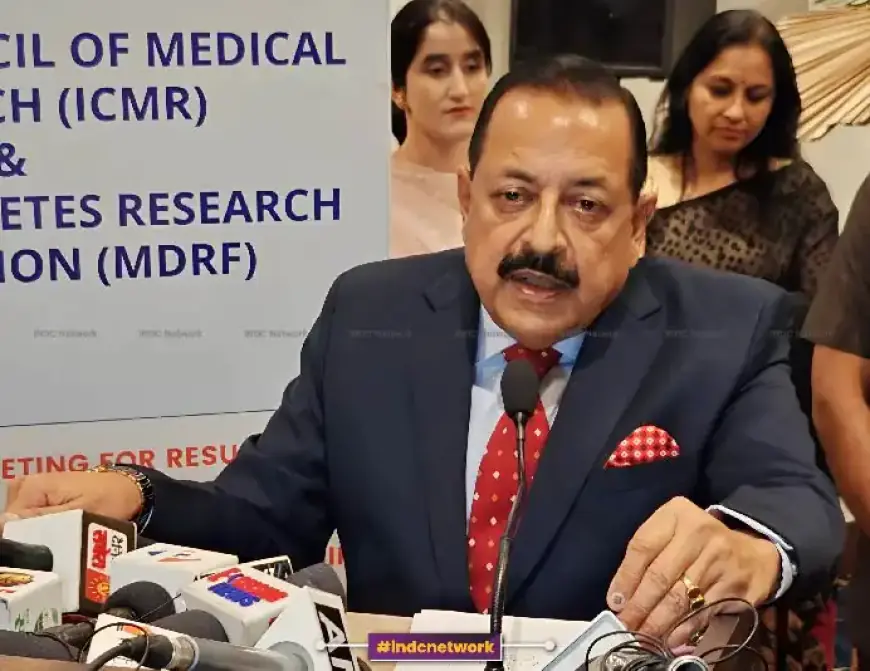India’s Largest Diabetes Survey Shows 18.9% Prevalence in Jammu; Urgent Action Needed to Combat NCDs
Union Minister Dr. Jitendra Singh released critical findings from the ICMR-India Diabetes (INDIAB) study, highlighting an alarming 18.9% diabetes prevalence in Jammu region. The survey reveals a higher rate of 26.5% in urban areas, with 14.5% in rural zones, surpassing the national average. Dr. Singh emphasized the importance of prevention, early detection, and raising awareness to combat the growing epidemic of diabetes and other Non-Communicable Diseases (NCDs). The Minister also announced the establishment of 1.5 lakh Health and Wellness Centres across India, focused on controlling NCDs, as part of the government's preventive healthcare push.

INDC Network : Jammu & Kashmir : In a significant revelation, Union Minister Dr. Jitendra Singh, a renowned Diabetologist, unveiled the findings of the world's largest diabetes survey, the ICMR-India Diabetes (INDIAB) study, specifically focusing on the Jammu region. Released today, the study presents worrying statistics about the prevalence of diabetes and other Non-Communicable Diseases (NCDs) across Jammu and Kashmir, underscoring the urgent need for targeted health interventions.
The survey, conducted across 10 districts in Jammu, reveals a staggering 18.9% diabetes prevalence in the region, with urban areas showing a higher rate of 26.5% compared to 14.5% in rural areas—both of which are above the national average. This data paints a concerning picture of the health landscape in Jammu, where diabetes and related conditions like hypertension and obesity are rising rapidly.
Dr. Jitendra Singh expressed grave concern over these figures, urging both government and non-government stakeholders, including healthcare institutions, NGOs, and media, to amplify efforts in raising awareness and implementing preventive strategies. "We need a multi-sectoral approach to control diabetes before it becomes an epidemic," he said, adding that the findings from this study provide a critical opportunity for intervention to prevent and control NCDs.
Highlighting the importance of this study, Dr. Singh described it as a "landmark" in understanding India’s diabetes burden. The study not only sheds light on the current state of diabetes in Jammu but also provides valuable insights for policymakers and healthcare professionals. By focusing on prevention, control, and early detection of diabetes, it offers a roadmap to mitigate the growing NCD crisis in the region and across India.
According to the ICMR-INDIAB study, the prevalence of prediabetes in Jammu stands at 10.8%, indicating a large section of the population is on the verge of developing diabetes. The study also reported a high prevalence of hypertension (27.1%), generalized obesity (41.7%), and abdominal obesity (62.7%) in the region. The findings underscore the need for urgent public health interventions to address lifestyle diseases, which are fast becoming major contributors to morbidity and mortality in the region.
The survey, conducted by the Madras Diabetes Research Foundation in collaboration with ICMR and the Department of Health Research, covered 1,520 participants from both urban and rural areas. These insights offer a comprehensive understanding of the health challenges faced by Jammu’s population, setting the stage for effective health interventions.
In response to the rising burden of NCDs, Dr. Jitendra Singh emphasized the government’s commitment to preventive healthcare. He announced that the government is in the process of establishing 1.5 lakh Health and Wellness Centres across India, with a primary focus on preventing and controlling NCDs such as diabetes, hypertension, and certain types of cancer. These centres, he said, are part of Prime Minister Narendra Modi's vision of a preventive healthcare ecosystem for the country.
Dr. Singh credited PM Modi for spearheading efforts to promote preventive health practices in India, especially through the use of traditional medicine systems like Ayurveda and Unani, along with yoga. “Prior to the COVID-19 pandemic, the concept of preventive healthcare was unfamiliar to many in India. Thanks to PM Modi, the nation is now awake to the importance of prevention, and we are working to build a healthier future for all,” he said.
The Minister also stressed the importance of focusing on the youth, who he described as the "architects of a developed India" by 2047. He warned that unless concerted efforts are made to protect the younger generation from lifestyle diseases, the country’s future growth could be jeopardized. "We cannot afford to let the energy and potential of our youth be consumed by a preventable disease like diabetes," Dr. Singh said, calling for urgent measures to ensure their health and well-being.
Dr. Singh concluded by highlighting the vast potential of Jammu and Kashmir’s untapped Himalayan bio-resources, which could contribute to India’s economic growth. He expressed confidence that with the right interventions, J&K would become a major contributor to India’s growth story in the near future.
The findings from the ICMR-INDIAB study are expected to serve as a foundation for developing targeted health policies and interventions, aimed at preventing and managing diabetes and other NCDs, ensuring a healthier and more prosperous future for India.
(With inputs from - PIB)
What's Your Reaction?













































































































































































